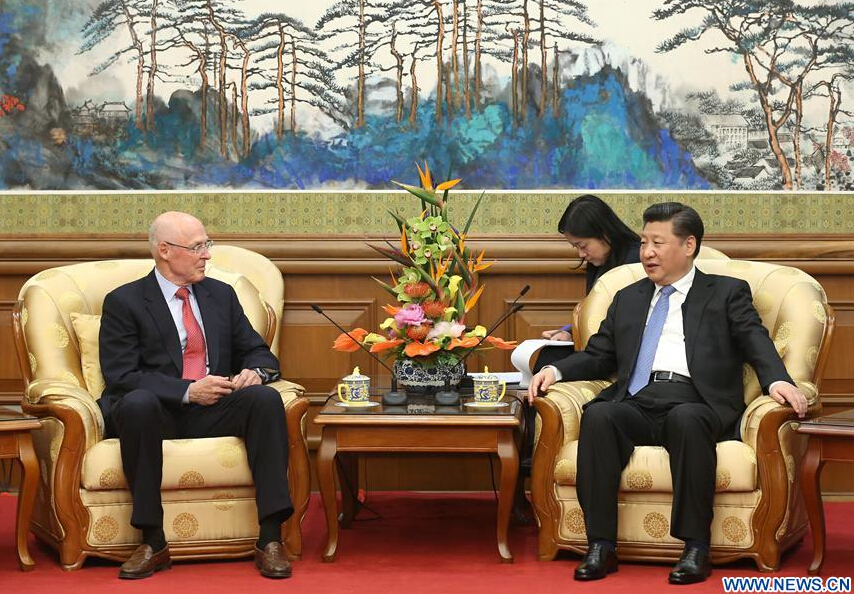Let us focus on cooperation and manage differences
- By Wu Jianmin
 0 Comment(s)
0 Comment(s) Print
Print E-mail China.org.cn, May 4, 2016
E-mail China.org.cn, May 4, 2016
|
|
|
Chinese President Xi Jinping (R) meets with former U.S. Secretary of the Treasury Henry Paulson in Beijing, capital of China, April 19, 2016. [Xinhua/Pang Xinglei] |
On April 19, President Xi Jinping met with Mr. Henry Paulson, former US Secretary of the Treasury. Commenting on the Sino-US relationship, President Xi pointed out that China-US relations as a whole are developing in a sound manner. “In the next stage, the two countries should make joint efforts to strengthen communication, focus on cooperation and manage differences to push for sustainable, healthy and steady development of China-US relations.”
"Focus on cooperation and manage differences.” This is the right path to advancing Sino-US relationship.
There is a wide range of areas for further Sino-US cooperation, including conflicts in the world’s hotspots, bilateral economic, trade and investment cooperation, people-to-people exchanges, military-to-military exchanges and security cooperation.
President Xi said in 2013 that the economic relationship between China and US is the ballast of Sino-US relationship. He’s right. As we look back at the evolution of our bilateral relationship in the past 45 years, we can see that China-US economic cooperation has always been an important driver. In 1971, when Dr. Henry Kissinger came to China for the first time, China-US trade amounted only to $5 million yearly. By the end of 2015, the annual figure had climbed to $560 billion. China had become the largest trading partner of US. What led to this fabulous growth was mutual benefit. In the new century, to fuel continuous economic cooperation between China and US, we need a new driver, which is investment.
Currently, China and US are negotiating a BIT (bilateral investment treaty). Both President Xi and President Barack Obama want to speed up this negotiation and achieve an early conclusion, which will take China-US economic cooperation to a higher stage and will strengthen mutually beneficial ties between our two important countries.
The G20 Summit is scheduled to be held September 4-5 this year in Hangzhou. This is the first time that China will host the G20 Summit. The G20 is the most representative and most important body to guide global economy and finance: The GDP of G20 countries accounts for 90% of global GDP, and 80% of the world’s trade. Current global economic growth is sluggish. The international community expects the G20 Hangzhou Summit to give a strong boost to global economy, and China-US cooperation is the key to the success of this summit.







Go to Forum >>0 Comment(s)